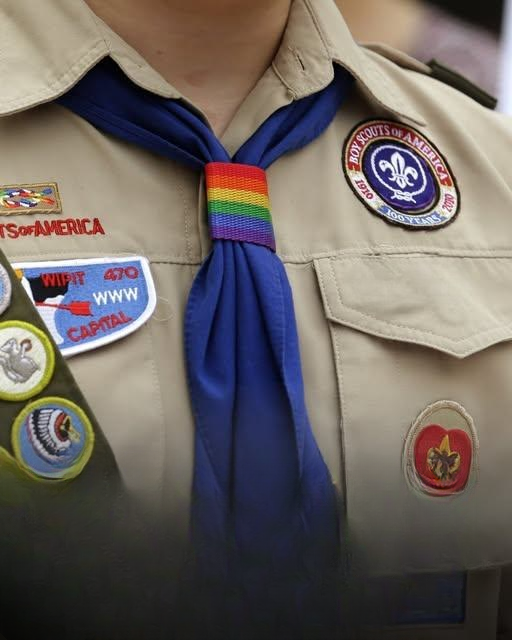For more than a century, the Boy Scouts of America (BSA) has been a familiar part of American culture — a name associated with camping trips, community service, and lifelong lessons about leadership and character. But in 2025, this historic organization is taking a bold step into the future. After 114 years, the Boy Scouts of America is officially changing its name to Scouting America — a move that signals more than a rebrand. It represents a transformation in values, vision, and inclusivity, setting the stage for a new era in youth development.
The announcement came during the organization’s annual meeting in Florida, where Roger Krone, the organization’s new Chief Executive Officer, called the decision “a moment of transformation” and “a declaration that Scouting is, and always will be, for everyone.” The change will officially take effect on February 8, 2025, coinciding with the 115th anniversary of the organization’s founding.
For Krone and millions of members across the nation, the new name, Scouting America, is not just a modern adjustment — it’s a reflection of a deep cultural shift and an effort to create a welcoming environment for all young people, regardless of gender, background, or identity.
The End of an Era and the Birth of a New Identity
For much of the 20th century, the Boy Scouts of America was a household name, known for its values of preparedness, citizenship, and outdoor adventure. Generations of Americans grew up in scouting, earning badges, attending jamborees, and learning the motto that became synonymous with self-reliance: “Be Prepared.”
But as society changed, so did the expectations placed on national institutions. What once stood as a proud symbol of American youth began facing new challenges. Membership declined, public trust eroded, and long-standing debates about inclusion and equality grew louder.
By the 2010s, it became clear to many within the organization that the BSA needed more than a public relations update — it needed a complete redefinition of its purpose and identity.
“The name ‘Boy Scouts’ no longer reflects who we are,” said Krone. “Our mission has always been to help all young people build confidence, character, and leadership skills. The new name, ‘Scouting America,’ tells that story clearly and inclusively.”
This transformation marks a profound moment in the organization’s 114-year journey. It acknowledges its history while embracing a modern understanding of what it means to serve all American youth.
A Decade of Change: The Road Toward Inclusion
The decision to become Scouting America did not happen overnight. It is the culmination of over a decade of internal reform and social adaptation.
In 2013, the organization took its first major step toward inclusivity by lifting its ban on openly gay youth. This was followed in 2015 by the decision to allow openly gay adult leaders. Two years later, in 2017, transgender boys were welcomed into the program for the first time. And in 2018, one of the most significant milestones arrived — the organization opened its doors to girls, creating co-ed troops under the name Scouts BSA.
Each policy change brought both praise and criticism. Some long-time members felt that the core traditions of the Boy Scouts were being diluted, while others celebrated the changes as long-overdue progress. The reforms sparked important national conversations about inclusion, representation, and the evolving definition of community leadership.
Over time, however, these changes helped rebuild the organization’s image. Families that once felt excluded began to participate, and young people across the country found in Scouting a place where they could learn, belong, and grow.
“Names matter,” said Ellen Jacobsen, a troop leader from Colorado. “When you tell a young person that they belong, they need to see that truth reflected in every part of the organization — including its name. ‘Scouting America’ makes that message clear.”
Facing the Past: From Reckoning to Renewal
The road to renewal was not without pain. In 2020, the Boy Scouts of America faced one of the most difficult chapters in its history. The organization filed for Chapter 11 bankruptcy after thousands of individuals came forward with claims of past abuse within its ranks. The resulting settlement — totaling over $2.4 billion — became one of the largest of its kind in U.S. history.
The scandal deeply shook the public’s trust and forced the organization to confront uncomfortable truths. Camps closed, membership declined sharply, and questions arose about whether the century-old institution could ever recover.
But instead of hiding from its past, the new leadership made a different choice: to acknowledge the harm done, strengthen protections, and rebuild the foundation from within.
“We can’t undo what happened,” said Krone during the rebranding announcement. “But we can ensure it never happens again. ‘Scouting America’ represents a new era of safety, transparency, and opportunity for every young person who wears the uniform.”
The name change, therefore, is not just symbolic — it’s a declaration of responsibility. It represents a promise that the mistakes of the past will be used as lessons to build a safer, stronger, and more ethical future.
Reactions from Across America
The decision to rename the Boy Scouts has sparked widespread discussion across the nation. As with any major cultural change, reactions have been mixed.
Conservative commentators, including Senator Ted Cruz, criticized the move, suggesting that the organization was abandoning its traditions. Some online voices expressed frustration, claiming that “erasing boys from the Boy Scouts” meant losing a core part of American heritage.
On the other hand, supporters hailed the change as a forward-looking and necessary evolution. For them, Scouting has always been about values, not labels. It’s about teaching responsibility, respect, and teamwork — principles that apply to everyone, regardless of gender or identity.
Polls show that a majority of Americans under 40 support the rebrand, viewing it as an important reflection of modern values. Many see the new name as an opportunity to renew the mission of Scouting for a more diverse and interconnected world.
“The world our kids are growing up in looks different than it did 50 years ago,” said Jacobsen. “Scouting has to grow with them — not against them.”
Building the Future: What “Scouting America” Means Today
Beginning in early 2025, Scouting America will roll out a nationwide campaign to introduce the new brand. This initiative is not just about marketing — it’s about education and community building.
The organization plans to highlight four key pillars that define its modern mission:
- Character and Leadership Development – Empowering youth with skills to lead, serve, and make ethical decisions.
- Environmental Stewardship – Teaching the importance of sustainability, conservation, and respect for nature.
- Diversity and Inclusion – Ensuring that Scouting is accessible and welcoming to all communities.
- 21st-Century Skills – Expanding programs into science, technology, engineering, and math (STEM), as well as digital literacy.
This approach blends the traditional strengths of Scouting — outdoor education, service, and teamwork — with new programs that reflect the needs of today’s youth.
“Camping, hiking, and first aid will always be part of who we are,” said Krone. “But Scouting today also means learning about cybersecurity, climate change, and community activism. The outdoors may look different in the digital age, but the lessons we teach are timeless.”
Local councils are already updating signage, uniforms, and handbooks to reflect the new name. The Scouts’ iconic fleur-de-lis emblem will remain but with a refreshed design symbolizing unity and renewal.
Why This Change Matters
The rebranding to Scouting America is more than a cosmetic shift — it represents a philosophical transformation. It’s an acknowledgment that belonging and leadership must evolve alongside society.
For many, this moment feels like a reconciliation between the organization’s past and its future. By opening its doors to all young people, regardless of gender, background, or belief, Scouting America redefines what it means to prepare the next generation of leaders.
The change also reflects a broader cultural movement in the United States — one that emphasizes inclusion, respect, and community over exclusion or division. In this sense, the Scouts’ evolution mirrors the story of America itself: a nation continuously learning, growing, and redefining what it means to stand together.
A Century of Legacy and Learning
Founded in 1910, the Boy Scouts of America has played a central role in shaping the character of millions of young people. It has been a training ground for civic leaders, explorers, and innovators. Its alumni list reads like a who’s who of American achievement — including figures like John F. Kennedy, Neil Armstrong, and countless others who carried Scouting’s lessons into their personal and professional lives.
Through world wars, social revolutions, and cultural shifts, Scouting has endured — adapting to each generation while maintaining its focus on values such as trustworthiness, loyalty, kindness, and bravery.
The organization’s transformation into Scouting America represents not a rejection of this past but a continuation of it — one that ensures those timeless lessons remain relevant to every young person in the modern world.
Community Voices: Stories of Renewal
In towns across the country, local troop leaders are already seeing how the name change is inspiring renewed interest.
In California, one troop that was among the first to welcome girls reported record participation numbers. “Our troop used to have 12 members. Now we have 30,” said Scoutmaster Daniel Reyes. “The name Scouting America tells families right away that everyone belongs.”
In Texas, a small-town troop that nearly closed during the pandemic found new life through a partnership with local schools. They launched a digital badge program focused on environmental science and community volunteering.
These stories are part of a growing wave of optimism — a belief that the new identity is giving Scouting fresh purpose in a rapidly changing society.
Scouting in the Digital Age
As the organization looks to the future, one of its biggest challenges will be adapting Scouting traditions for a generation raised on technology. Today’s youth navigate a world of smartphones, social media, and virtual connections — a world far different from the one their grandparents knew.
Scouting America aims to bridge that gap by integrating digital education into its classic outdoor curriculum. Programs in cybersecurity, robotics, and sustainability are being developed to teach real-world problem-solving skills. The goal is to prepare young people not just for camping in the wilderness, but for navigating the challenges of the modern world responsibly.
The message is clear: whether online or outdoors, the spirit of Scouting — curiosity, teamwork, and resilience — remains the same.
Restoring Trust and Rebuilding Purpose
After years of legal and financial challenges, Scouting America’s leadership recognizes that trust must be earned, not assumed. The organization has introduced enhanced youth protection training, background checks, and transparency measures to ensure safety for every participant.
These steps have been met with cautious optimism from parents and community partners. Many see the new name and policies as a turning point — a commitment to ethical reform and accountability.
“Rebuilding trust takes time,” Krone acknowledged. “But every action we take now is about showing families that Scouting is a place where children can grow safely, confidently, and proudly.”
Looking Ahead: The Promise of a New Beginning
As Scouting America celebrates its 115th anniversary, the organization stands at a crossroads between history and innovation. Its legacy is rich, but its mission is far from complete.
The new name carries both weight and hope — a reminder that Scouting is not about who you are when you join, but who you become through the journey.
In Krone’s words: “Scouting has never been about exclusion. It’s about building courage, character, and compassion. With Scouting America, our doors are open wider than ever before. The future of Scouting belongs to everyone.”
A Legacy Reimagined
From its humble beginnings in 1910 to its rebirth in 2025, the Scouting movement has witnessed extraordinary change. It has weathered cultural shifts, faced controversy, and embraced transformation. Yet its heart — the belief that young people can make the world a better place — has never wavered.
As one of America’s oldest and most influential youth organizations, Scouting America now carries forward a century-old promise: to prepare every child for life with confidence, compassion, and purpose.
With renewed commitment, inclusivity, and transparency, Scouting America looks to the horizon — ready to serve a new generation of explorers, dreamers, and leaders.
The campfires may look different, and the uniforms may bear a new name, but the mission remains timeless:
To build character, foster community, and light the way toward a better tomorrow — for all of America.



